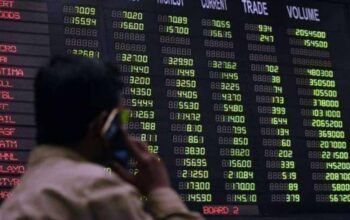By Staff Reporter
ISLAMABAD: Pakistan’s large-scale manufacturing sector grew 2.29% in April from a year earlier, but the uptick couldn’t reverse a 1.52% contraction over the first 10 months of fiscal 2025, highlighting persistent economic strain.
The Quantum Index of Large Scale Manufacturing Industries (QIM) climbed to 108.37 in April 2025 from 105.93 a year prior, data from the Pakistan Bureau of Statistics showed Tuesday.
Automobiles led the charge, surging 42.16% year-on-year, followed by cotton yarn (up 8.40%), garments (6.01%), petroleum products (5.01%), and cotton clothes (0.75%). Still, the index slid 3.2% from March, pointing to month-to-month instability.
For the July 2024-April 2025 period of fiscal year 2024-25, the Large-Scale Manufacturing Industries (LSMI) shrank 1.52% compared with the same 10 months a year ago.
Growth in tobacco, textiles, wearing apparel, coke and petroleum products, automobiles, and other transport equipment was outpaced by declines in food, chemicals, non-metallic mineral products, iron and steel, electrical equipment, machinery, and furniture.
The LSMI serves as a critical barometer of Pakistan’s industrial health, representing around 69% of the manufacturing sector, a sub-component of industry, and approximately 8% of the nation’s overall GDP. Tracked monthly through the QIM, its performance offers key insights into economic trends for policymakers and investors.
In April 2025, several industries drove the year-on-year uptick. The automobile sector led with a robust 42.16% growth, followed by cotton yarn at 8.40%, garments at 6.01%, petroleum products at 5.01%, and cotton clothes at 0.75%.
However, the gains were tempered by declines elsewhere, with sugar production dropping 14.55%, iron and steel falling 10.11%, cement decreasing 5.62%, and fertilizers slipping 0.73%. The month-on-month drop from March underscored short-term instability in the sector.
For the July-April 2024-25 period, the LSMI shrank by 1.52% compared to the same timeframe in the prior fiscal year. Growth was recorded in tobacco, textile, wearing apparel, coke and petroleum products, automobiles, and other transport equipment, while declines hit food, chemical products, non-metallic mineral products, iron and steel products, electrical equipment, machinery and equipment, and furniture.
Breaking down the cumulative performance, key contributors to the LSMI index emerged. On the positive side, garments added 0.91 percentage points, automobiles contributed 0.73 points, textiles 0.49 points, petroleum products 0.35 points, and tobacco 0.17 points. Conversely, furniture was the largest drag, subtracting 1.82 points, followed by non-metallic mineral products at 0.61 points, food at 0.50 points, iron and steel products at 0.47 points, and chemicals at 0.42 points.
Detailed sector contributions over the 10-month period further illustrate the uneven landscape. Positive performers included beverages (0.15%), tobacco (0.17%), textiles (0.49%), wearing apparel (0.91%), leather products (0.01%), paper and board products (0.03%), coke and petroleum products (0.35%), pharmaceuticals (0.16%), automobiles (0.73%), and other transport equipment (0.15%).
Wood products, rubber products, and computer, electronics, and optical products showed no growth. On the downside, food subtracted 0.50 points, chemicals 0.42 points, chemical products 0.38 points, fertilizers 0.04 points, non-metallic mineral products 0.61 points, iron and steel products 0.47 points, fabricated metal 0.06 points, electrical equipment 0.42 points, machinery and equipment 0.18 points, furniture 1.82 points, and other manufacturing 0.08 points.
Copyright © 2021 Independent Pakistan | All rights reserved




